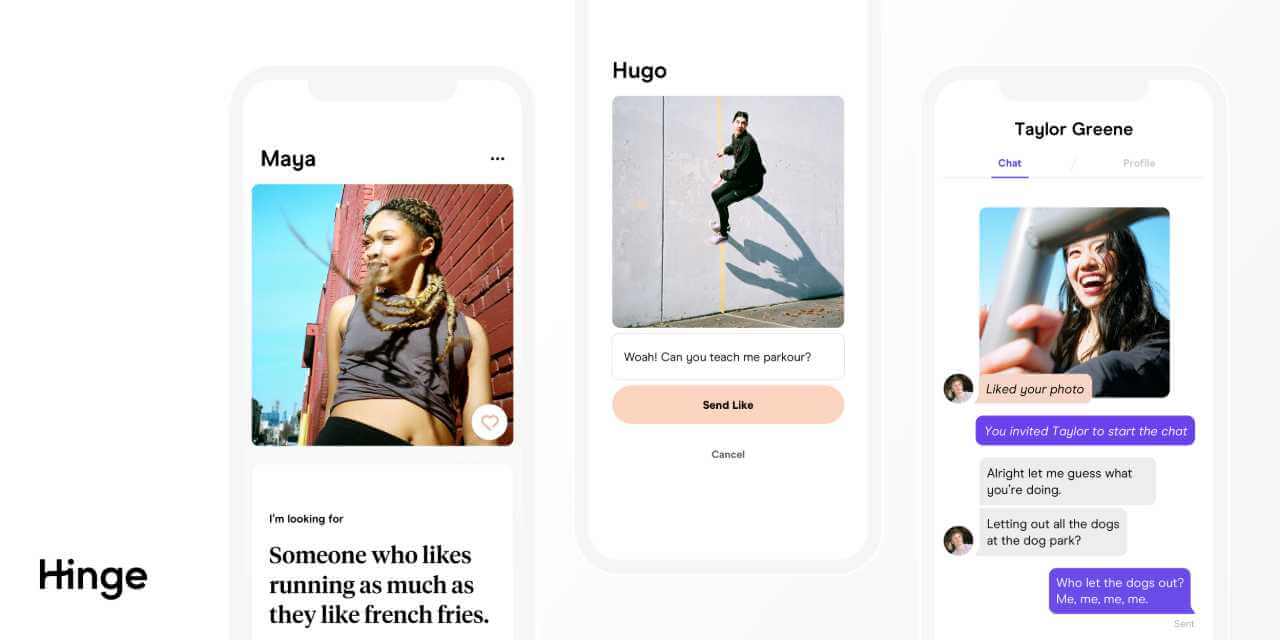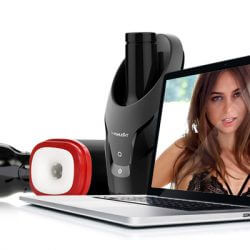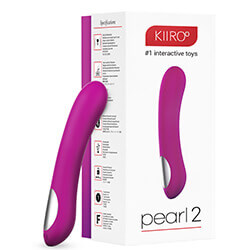The Seven Days of Swiping, Day 3: Hinge, the App That Makes You Put Your Best Foot Forward
Hinge is the app for serious dating, but how serious should you be about it?

Of all the dating apps that have existed, Hinge has easily gone through the most changes in the shortest amount of time.
Founded in 2012 by CEO Justin McLeod, Hinge began as a premium site like Match.com where users paid $7 a month to use it.
Between 2016 and 2017, the app changed to the freemium structure like Tinder and Bumble—free for all users but with premium services for users who want to pay extra.
Following the change to a freemium model, Hinge would become a North American phenomenon, quickly surpassing its competitors and joining a top-five spot with Tinder, Bumble, OKCupid, and Match.com.
This would be good for Match Group Inc., which would purchase 100% of the company in 2019. This purchase gave Match Group Inc. a controlling stake in the dating app market, as it now owned four of the five top apps, save for Bumble which is owned by Magic Lab.
What is Hinge?
Hinge is an app that claims to be the most dating-friendly app, with the tagline “designed to be deleted.”
Unlike Bumble and Tinder, Hinge ignores swiping and instead requires users to pick something about someone’s profile to like and write the potential match a message based on what they picked. Message recipients can then choose to message back, create a conversation, or ignore the message—no timers in sight.
On Hinge, profiles are unique for each user. The app asks users to answer 15 questions about themselves, and then it allows other users to search for people who match on six criteria for free users (age, location) and 15 criteria for premium users (height, education level, drinking and smoking habits, etc.).
For both free and premium users, the profile displays these traits prominently, allowing people to search for others based on desirable criteria.
Hinge gives free users the opportunity to message about ten people a day. Because the app only gives about ten likes on a daily basis, many people will use Hinge alongside the other dating apps.
Casual users only have to use the app 10 to 15 minutes a day, and serious users can judge people much more easily compared to Tinder and Bumble where information is less prominent.
Why should you use Hinge?
Hinge is a good app for people who are interested in serious dating and want to put the time in. While people may only spend ten minutes matching with others each day, it takes some time to create a profile and the profiles are unique to each user as a result.
This discourages people from looking for casual relationships or hookups on Hinge because it is easier to just make a Tinder or Bumble profile instead.
While Hinge seems like a dream come true for anyone serious about dating, there are a number of issues with the implementation that stand in the way of it being the perfect app.
Although Hinge is currently free from this, many of Match Group Inc.’s other properties, such as Tinder and OkCupid, have been known to sell their user data. Also, Hinge’s userbase is much smaller than those of industry giants Tinder and Bumble, making location a legitimate factor for your consideration.
Below, we discuss the positives and negatives you should know when considering whether Hinge is the right dating app for you.
The positives
1. Serious inquiries only
Hinge bills itself as the best app for serious dating, and it is hard to argue against that.
You can like a few people a day, which makes you see people as legitimate relationship material rather than just a bunch of random faces to swipe on. You have to think through what you are going to say to a person because you have to like something specific about someone’s profile.
Hinge requires you to think about who you are swiping on rather than just whether or not you want to swipe.
Hinge closely mirrors what it is like to go up to someone in real life, just without the fear of rejection. You cannot just wave someone over to tell you you like them—you must plan your approach.
Because of the mental energy and strategizing that goes into being successful on Hinge, the only people using it will be those who are willing to put the energy into actual, serious dating.
2. An algorithm that wants the best for you
On most dating apps, the algorithm puts attractiveness high on the priorities for making matches.
We previously saw that Bumble puts people who like you over people who have not seen your profile yet. Hinge takes the algorithm step further—Hinge factors in whether you actually go on dates with your matches.
After you start a conversation with someone, you can delete the match at any time. When you do, you have the option to report that you met your match in-person, and Hinge improves your placement across peoples’ stacks if you do.
Hinge will also send you someone once a day who you are “highly compatible” with based on who you have liked already. High compatibility is not a perfect system, but it is far better than what other apps do.
3. Hinge is the only app that practices what it preaches
Overall, there are a number of positives that come with Hinge as a serious dating app. Its acquisition by Match Group Inc. has made it one of several apps that offers a unique experience for its users.
Instead of competing with other apps that all do the same thing, Match Group Inc. does a great job of creating multiple products that each fill a unique role.
But the acquisition of Hinge has not been a sole good, and many of Hinge’s issues can be tied directly to being one of the smaller moneymakers compared to Tinder and Match.com.
As we next show, while Hinge is undoubtedly a well-designed app and force for dating good, it will never have the market share Tinder has, despite being almost completely unique.
The negatives
1. Match Group Inc.’s beliefs about user data
As we continue our foray across dating apps in our Seven Days of Swiping series, we may seem like a broken record. However, data will continue to be one of the points we talk about because everyone should care about how companies measure use with and without your permission.
Of all the dating apps that exist, Hinge is easily one of the most, if not the most, effective dating app at gathering data. We have already discussed how multiple Match Group products sell user data, but Hinge is the only app where self-disclosure is a requirement.
You are unable to use any app features until you have answered all the questions about yourself, including height, religion, smoking, and drinking habits, and answering these questions wrong may hurt your dating prospects.
Hinge was worse when it originally went freemium in 2017 because the app required users to upload the maximum of six pictures in order to start liking others and receiving messages.
They changed this in 2018, making adding pictures optional. But even with only one picture, the app will still get a minimum of 16 data points about you, and the fact that this is a requirement of using the app should make any data-conscious app-user wary.
2. The app is free, but it still costs time
It takes about 10 to 15 minutes to make a profile, and two to three minutes to send a like to someone. This means that there will be fewer users, and the people who do use Hinge will be dedicated to something longer-term.
For a lot of people who do online dating, this level of commitment at the beginning will be a turn-off, so unless you are looking specifically for serious dating, Hinge will not be the right choice for you.
As well, because most people who use Hinge also use one of the other big apps, you can find most of the people on Hinge on Tinder, meaning you will not have any fear of missing out.
3. Where is everybody?
Another side effect of taking time to create a profile is that very few people will ever try to make an account, and fewer people will ever follow through.
In large cities that have millions of people living within 20 miles or 35 kilometers, having a small worldwide userbase is not an app-killer because many of its users are likely concentrated in your area.
However, if you live in a town of 100,000 or even 500,000, the population of users trends lower despite it taking the same amount of time to create an account wherever you are.
If there are fewer users in a place, then it will be challenging for Hinge to every gain traction without the app creators stepping in with targeted marketing.
4. Hinge doesn’t purge its inactive profiles
The biggest weakness of Hinge’s small userbase is when you set “dealbreakers” on your profile.
Dealbreakers on the app are a good design choice in theory because Hinge will only show people within the preferences you set, such as certain distance away or, with premium, preferred height, religion, etc.
However, when Hinge runs out of recent users, the app will still show people to you—specifically, profiles that have not been active in months to keep engagement high.
This means that users may be liking people who haven’t opened the app in months, and will never know how much time they are wasting by keeping engagement up.
The fact the app doesn’t delete or hide dead profiles hurts the credibility of the app and its creators and reflects how Hinge, at the time of writing, puts user engagement over dating success into its dating app.
As we move toward an era where bots are sending fake messages and catfishing is becoming a norm, dating technology should be building user trust in their design.
However, you should consider how you might feel if you put time and energy into crafting your message and that no one would ever receive it.
Stuff you should know
1. Corner on the market
Hinge has the potential to be the number one app for serious dating, and many would argue that it already is.
Hinge had a wildly successful marketing campaign in 2019 which suggests that the people behind it are savvy business owners. If the owners were to redouble their efforts to increase their userbase in smaller areas, Hinge would easily be the best dating app overall. This may probably never happen.
Although Hinge would benefit from an algorithmic overhaul and marketing, Hinge being popular would create competition between Hinge and Match Group Inc.’s other products. They already have the most popular dating app—why would they want to steal people from their most popular product to a less-popular one?
At the very least, if they do make sweeping improvements, the updates would not come out nearly as quickly as if Hinge were the top app. While each of Match Group’s apps is unique in its own way, another app will have to usurp Tinder’s top position to get the same level of care.
2. The sunk cost fallacy
In behavioral economics, there is a theory known as the sunk cost fallacy that causes people to invest more time or money into something they have already spent a lot of time or money on.
In dating app technology, an example of this philosophy can be seen in Match.com’s app, because it is free to make a profile, but costs money to see any messages sent by others.
If you spend 20 to 25 minutes creating a profile but cannot use the app effectively without paying, you may spend more money because you want a return on that investment.
Hinge is first and foremost a product, and Match Group would naturally want a return on its investment. For users, just be wary about an app that has a marketing gimmick of being deleted, because it will want to maximize engagement and profit while it is present in your life.
So, should you use Hinge?
Hinge is a dating app that has the best argument for existing in theory, but also has an execution that might make a lot of people think twice before downloading it.
An app that prioritizes serious dating is important, and creating a profile for serious dating should always take longer than one that allows for a variety of relational goals, such as hookups on Tinder.
But when Hinge puts no effort into pruning dead profiles and has small userbases outside of major cities, dating app users might find their time better spent elsewhere.
There are really only two times Hinge will be a better choice over other apps:
- If you have had negative experiences with other apps and find having more information about potential matches preferable.
- If you live in a place with at least one million people so that you never run out of people to swipe on no matter which app you use.
Until we see Hinge make an improvement, it is challenging for us to give Hinge a serious recommendation if you are outside the groups we mentioned above.
But if you have had a positive experience on Hinge, or if you agree with us on any of our coverage of the dating apps so far, let us know in the comments below!
Image sources: Hinge
Leave a reply
You must be logged in to post a comment.
















